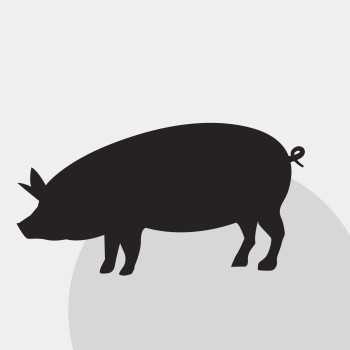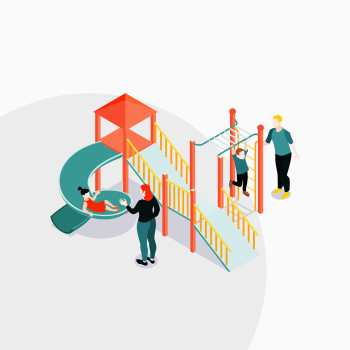
- Following UOKIK’s intervention, the standing of pig producers in the contractual fattening system will improve.
- Agrifirm Polska and Agri Plus have pledged to change their practices.
- This will ensure that farmers do not suffer financial consequences for events beyond their control.
Pig producers are a fundamental part of the pork supply chain to the market. According to the research made by UOKiK, in 2021 in Poland, 20-22 percent of the purchase of pork livestock took place on the basis of contractual pig fattening agreements. This compares to 12-15 percent in 2016, depending on the number, weight or value of pigs purchased.
In the contractual (overlay) fattening model, a farmer rears piglets or fattens piglets on behalf of a meat corporation or feed manufacturer. They are provided with strict guidelines on rearing techniques, including the amount and type of feed given. Broadly understood inputs, such as piglets and feed, as well as a certain amount of veterinary care are provided by the system organizer. It is obliged to buy back the fattening pigs from the farmer at an agreed price, at an agreed time and after the animals have reached the designated weight. In the final settlement, it deducts the amount due for the inputs supplied to the pig producer and also reduces the remuneration for failure to achieve certain results, such as the weight achieved or excessive feed consumption.
A farmer working in the overlay fattening system may count on fixed income, thus avoiding the cyclical fluctuations in porker purchase prices that are characteristic of this market. However, it is responsible for properly caring for the animals and paying for the costs of rearing, including energy, water, insurance, erecting and maintaining infrastructure, and paying employees. The profitability of a farmer's cooperation with a fattening organizer depends crucially on the principles adopted for calculating the price in relation to its costs: the quality of the feed supplied, the health of the piglets purchased from the fattening organizer and the veterinary care provided. In addition, the farmer's earnings are subject to price deductions stipulated in the contracts.
As part of its investigations, UOKiK has challenged the fact that the agreements of Agrifirm and Agri Plus had not adequately provided for farmers' protection against the risks associated with contractual fattening. Meanwhile, most of the risks are related to the way these companies organize their cooperation with farmers and the quality of the inputs they provide.
– Our concerns were raised about the rules for setting prices for fattening pigs delivered to the contractual fattening system organizer. Agrifirm Polska and Agri Plus placed excessive risks on the farmer which could constitute unfair use of contractual advantage by these entrepreneurs. The parties ordering the fattening procedure reduced prices if the farmer failed to achieve the intended goals even if they themselves delivered animals in a condition that prevented them from reaching the required weight or defective feed. This is an unacceptable action as farmers should not be held liable if they exercised due diligence during the production process – says President of UOKiK, Tomasz Chróstny.
UOKiK has commissioned specialized scientific institutes under the Ministry of Agriculture and Rural Development to conduct analyses to develop rules that would reduce farmers' risks. In its opinion, the Institute of Zootechnics outlined the factors affecting the success of fattening and its profitability. On the other hand, the Institute of Agricultural and Food Economics compared the profitability of overlay fattening with individually managed fattening. For this purpose, UOKiK obtained directly from farmers cooperating with Agrifirm Polska and Agri Plus, the data on their costs which were cross-referenced by the institutes with data on the costs of independent pig farmers.
– For several years we have been looking at the principles of pig farming and the situation of farmers in this market. Producers choosing to raise animals in an overlay system often face difficult and unfortunately unfair conditions imposed on them by large corporations. Then we intervene. This time it was necessary to refer to the analyzes of institutes specializing in agricultural production – says President of UOKiK, Tomasz Chróstny.
Institutes' opinions on contractual fattening
The expert report of the Institute of Zootechnics explains that the economics of pig production is determined by a number of macro- and microeconomic factors. The former primarily include the price of pork livestock and the cost of inputs (feed, piglets), while the second group is the organizational structure of farms, i.e. the scale of production and the associated specialization and rearing system, the area of the unit and the degree of connection to the market. The organizational structure influences the production and technological indicators achieved, expressed by feed consumption, daily gains, pig meatiness, and sow fertility. In addition, their level is determined by production technology and technical progress, which is primarily due to the knowledge, skills and experience of the farmer themselves (...). The final result talking about the profitability of production is, according to the opinion of the Institute of Zootechnics, the account of the costs incurred (fixed and variable) for the production carried out and the income received from it, with the largest share of production costs being feed (70-75% of pork production costs).
The farmer's remuneration received from a pig contract fattening organizer is largely influenced by the feed conversion ratio (FCR). Its low level indicates high production efficiency (little feed allocated to produce a kilogram of porker body). However, according to the Institute of Zootechnics, there are a number of factors that can increase FCR, through higher feed consumption and longer fattening periods as well as increased falls during the rearing of animals. These include, first of all, the stress of adapting the piglets to new conditions, their origin from different farms, moving to different enclosures and grouping the piglets together, as well as the time and conditions of their transport. Higher pig mortality may also be influenced by the rearing technology and fattening conditions used.
As UOKiK has found, the fattening organizers (Agrifirm and Agri Plus) are responsible for purchasing, transporting, and delivering piglets in good health as well as for selecting rearing technology and providing feed. However, in the case of an excessive level of pig falls or an excessively high FCR, the farmer was paid less even though the conditions for transporting piglets and their health, a poorly chosen gait method, or a reduced quality of feed may have had an impact.
The Institute of Agricultural and Food Economics [IERIGŻ], in turn, presented an expert report titled: "Calculation of profitability of pork livestock production under the conditions of the market model (open fattening) and under the conditions of the contractual fattening model". As explained in the IERiGŻ opinion, the economic efficiency of pork livestock production is determined by the profitability index. This indicator tells how many percent the value of production, expressed in current prices, covers the costs incurred to produce it.
The expert report presents pork livestock results based on research conducted under the supervision of IERiGŻ. The farms participating in the study conducted open fattening and were located throughout Poland. Revenues, i.e. the value of production calculated per 100 kg of gross livestock, costs incurred, and economic performance were evaluated. According to the Institute of Agricultural and Food Economics, the results of the study show that during the period under review, the profitability threshold in open (free market) fattening system was not exceeded - the profitability index was at 88.9%, which means a farm loss on production. On the other hand, in farms cooperating with Agrifirm and Agri Plus, these indicators were several percentage points above 100 percent during the same period which means that the farm's profitability from livestock production remained positive.
As summarized in the IERiGŻ opinion, comparing, on average in the sample, the performance of pork livestock under open and contractual fattening conditions, the predominance of contractual fattening was evident during the period under analysis. According to the institute, the findings also indicate that the scale of production is an important determinant of economic effects. At the same time, it should be noted that contractual-pig-fattening farmers keep more pigs on average than free-market-pig-fattening farmers which can affect cost efficiency and thus the profitability of production.
In conclusion, the opinions of research institutes under the Ministry of Agriculture and Rural Development submitted to UOKiK show that overlay fattening can be beneficial to farmers, for example, in the case of rising feed costs and lack of access to capital that allows for an independent rearing process. Studies show that independent pork livestock production is characterized by variable profitability and in the sample studied by the Institute of Agricultural and Food Economics, production was unprofitable over several years. The advantage of overlay fattening, according to the opinions of the above-mentioned institutes obtained by UOKiK, is the relative stability of cooperation with a large contractor, while this form is also characterized by a very low level of profitability.
The opinions presented had a significant impact on the conclusion of proceedings for unfair use of contractual advantage. Indeed, despite complaints about the way contract fattening is organized and the reservations of President of UOKiK about its various elements, expert reports have shown that this form of agricultural production can generate certain benefits to farmers. These include, first and foremost, access to capital, greater stability of production, including the certainty of receiving fattening pigs, and increased cost efficiency, thus maintaining the profitability of pig farming.
Therefore, President of UOKiK, having conducted the proceedings against Agrifirm and Agri Plus, which took into account the observations of scientific institutes, issued commitment decisions in their cases.
In his decision, the President of UOKiK obliged Agri Plus and Agrifirm to change their practices so as to eliminate elements from contractual fattening that unduly transfer risk to the farmer.
Agri Plus commitment
Agri Plus will introduce a longer time limit for farmers to verify delivered animals and feed and will initiate a complaint procedure for "low-quality" piglets and piglets, such as sick ones and defective feed. The procedure will take into account animal welfare.
Complaint procedure in Agri Plus – pigs
Already from the moment the animals are collected, farmers will be able to verify the condition of piglets and piglets themselves or with the help of a veterinarian and refuse to accept them if they have obvious defects. For animal welfare reasons, farmers will have to report this immediately after delivery, no later than 48 hours. This does not close the way for further complaints, following a more detailed inspection, the farmer will have 7 days from delivery to do so.
Producer applications will then be reviewed by the fattening system organizer. If the information indicated in the complaint is confirmed, then the cost of caring for the animal will be assumed by Agri Plus. If the company determines that the animals are of full value, then they will be subject to rearing and settlement under the terms of the agreement. However, this does not exclude the farmer's rights to pursue claims on general principles, in particular under the Civil Code.
Complaint procedure at Agri Plus – feed
The farmer will be able to raise objections to the quality of the feed within seven days of receiving it and provide a sample for testing. In special cases, the fattening system organizer will have the opportunity to visit the producer's farm in order to verify the questioned feed and its storage conditions. The testing will take place at a certified laboratory at Agri Plus' expense. If defects in the feed are confirmed, the organizer will have to immediately provide the farmer with feed in the same quantity.
Additional Agri Plus activities
Agri Plus had already made significant changes to the contracts during the proceedings. First and foremost, it index-linked the prices paid to farmers, significantly raising the minimum and maximum rates per porker. The company also withdrew a provision that provided for a reduction in the price of all pigs supplied by a farmer if a certain proportion of them exceeded weight limits.
Agrifirm Polska commitment
Agrifirm Polska, in turn, pledged to index-link the prices paid for pigs in the event of an increase in the cost of utilities which are borne solely by the farmer. Therefore, according to the condition imposed, if, before the start of the next fattening cycle, the costs of electricity, gas, steam and hot water are at least 12 percent higher than in the quarter in which the contract was concluded or the last index-link was made, the farmer will be able to apply for a rate index-linking based on quarterly data from the CSO, according to a formula specified in the decision. Agrifirm Polska will have to respond to such a request within 14 days of receiving it.
In addition, the company will have to bear the cost of purchasing medical supplies for vaccination against PCV2 (porcine circovirus type 2) in situations where the animals were not vaccinated before arriving at the contractual fattening farmer.
The commitment also applies to the time limits for complaints. In the case of animals, it will be 10 days, with a complaint filed between the 8th and 10th day requiring the presence of a committee that will include representatives of the farmer, Agrifirm Polska, the piglet supplier and an independent veterinarian. The time to claim defective feed will be 21 days.
Additionally, the provisions that entitle Agrifirm Polska to make price reductions for each fattening pig delivered to the slaughterhouse if the collapse thresholds specified in the contract are exceeded will be eliminated.
Agrifirm Polska will also organize, once a quarter between 2023 and 2025, training for farmers on how to improve their production performance and the rules for index-link of their wages. After 2025, it will post an informational brochure on the subject on its website.
The resolutions adopted by President of UOKiK will reduce risks and increase the profitability of pig production for those farmers who have decided to work in the overlay fattening model.
The entities affected by the decisions belong to large international capital groups. Agrifirm Polska is part of the Dutch feed manufacturer Royal Agrifirm Group while Agri Plus belongs, like meat producer Animex, to the Smithfield Foods group controlled by Chinese conglomerate WH Group - the world's largest pork producer. Intervening in the case of large market players should also send a signal to other overlay fattening system organizers that their contracts should be index-linked in such a way so as to include appropriate risk and value sharing between the organizer and the agricultural producer.
These are not the first decisions regarding contractual fattening system organizers. In 2022, President of UOKiK Tomasz Chróstny imposed more than PLN 68 million on Agri Plus for impermissibly depriving pig producers of public aid granted to them related to the reduced income of doing business in African swine fever (ASF) areas. The conducted proceedings indicated that actions of the entrepreneur constituted an unfair abuse of contractual advantage. Significantly, this decision also did not question the idea of contractual fattening but the unlawful reduction of producers' wages by the state aid granted to them.
Entrepreneur, farmer, if you operate in the agricultural and food industry and your major counterparty abuses its competitive advantage by imposing unfavorable conditions of cooperation – report it to UOKiK. We have launched a special form to help you report any irregularities. Click here to fill it out: https://ankieta.uokik.gov.pl/formularz-zgloszenie-przewaga/.
Information for the media
| +48 603 124 154 | |
| biuroprasowe@uokik.gov.pl | |
 | pl. Powstańców Warszawy 1 00-950 Warszawa |













